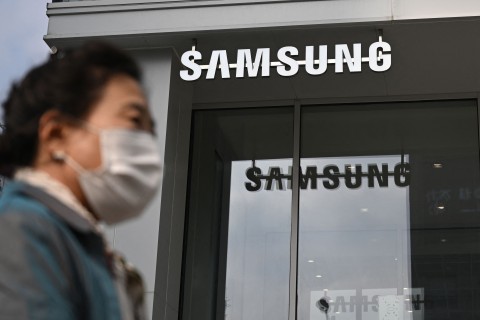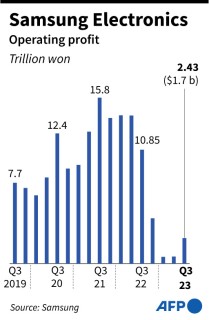
By Kang Jin-kyu
SEOUL, Oct 31, 2023 (AFP) – South Korea’s Samsung Electronics said Tuesday that its operating profits for the July to September period were down nearly 80 percent, but forecast that a prolonged slump in the memory chip market was coming to an end.
The firm is the flagship subsidiary of Samsung Group, by far the largest of the family-controlled conglomerates that dominate business in Asia’s fourth-largest economy.
Samsung announced third-quarter operating profits of 2.4 trillion won ($1.7 billion), down 77.6 percent year on year, citing “strong sales of flagship models in mobile and strong demand for displays” for a recovery from earlier quarters this year.
Although down sharply from 2022, the company’s third-quarter profit was well above the first quarter’s 640 billion won — the lowest since 2009 — and the second quarter’s 670 billion won.
The firm — one of the world’s largest makers of memory chips and smartphones — said artificial intelligence was driving demand and remained hopeful that memory market conditions will recover in 2024.
“Considering the normalisation of industry inventory level, we expect the recovery trend in the memory market to accelerate,” said Jaejune Kim, executive vice president at the memory division, during a conference call.
Demand was likely to improve in PC and mobile applications in the coming months, he added, due to the effect of peak seasonality — including year-end promotions — and “launches of new smartphones by major mobile customers”.

The company said net profit dropped 37.7 percent year-on-year to 5.8 trillion won — though it represents a rebound from the second quarter’s 1.7 trillion won.
Samsung said that “earnings in system semiconductors were impacted by a delay in demand recovery for major applications”.
Revenue from its networks business “declined in major overseas markets as mobile operators scaled back investments”, the company said.
Liz Lee, associate director of market research firm Counterpoint, said the earnings results were “better than expected”.
This was attributed “to narrowed chip losses and strong performances by its mobile device and display divisions”, Lee said.
“The losses incurred in semiconductors were offset by its MX (mobile experience) division and SDC (Samsung Display Corporation) thanks to the launch of the new flagship smartphones by Samsung itself and SDC’s client, Apple,” she said.
“Samsung could not avoid the blow from the prolonged decline in memory chip prices. The situation has not fully recovered in the chipset industry, hit by weakened consumer demand for tech gadgets amid spiralling inflation and rising interest rates.”
– 2024 recovery? –
South Korean chipmakers, led by Samsung, have enjoyed record profits in recent years as prices for their products soared, but the global economic slowdown has dealt a blow to memory chip sales.
Demand swelled during the pandemic as consumers bought computers and smartphones during lockdowns, prompting chipmakers to ramp up production.
But consumer appetite quickly diminished as lockdowns lifted and weakened further in the face of soaring inflation and rising interest rates.
“Looking ahead to 2024, PC and mobile demand is likely to benefit from the arrival of some replacement cycles for products sold during the initial phase of the pandemic,” the company said Tuesday.
In April, Samsung said it would make a “meaningful” cut in memory chip production, following the lead of rivals SK Hynix and Micron.
Tuesday’s earnings come weeks after the United States granted an exemption to Samsung and SK Hynix to acquire US-made chip production equipment for their China-based factories.
The green light came as the two firms were nearing the end of one-year waivers from US export restrictions aimed at China’s burgeoning semiconductor sector.
Washington and its allies have curtailed China’s access to major markets and advanced tech — including chip-making — over fears its products could give Beijing the ability to spy on their networks.







